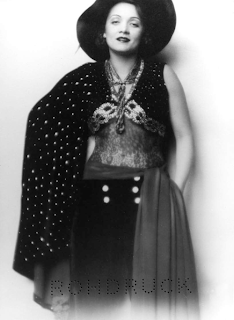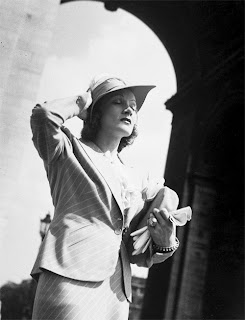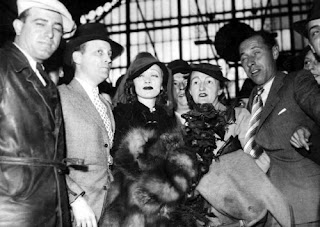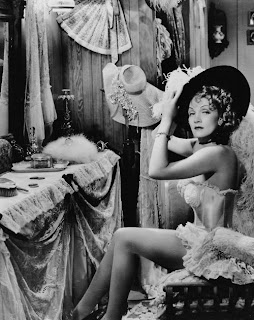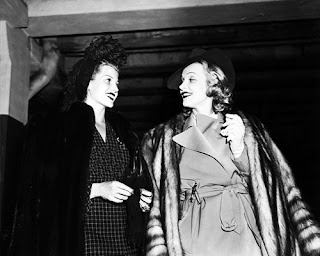JOSEF VON STERNBERG: “Here was the face I sought, something that told me my search was over. She leaned against the wings with a cold disdain for the buffoonery, in sharp contrast to the effervescence of the others.”
EAN WOOD: “Berlin night-life in the 20s had a flavor all its own. There were the world-weary cynical songs and sketches of its cabarets, and there were numerous clubs featuring sexual deviation (as it was then known). From 1925 on, Marlene became an active part of Berlin’s club and cabaret scene. This was partly because it was a good way to publicize yourself and partly because she just plain enjoyed it. One of her favorite haunts was the Eldorado Club, where every waitress, barmaid or hat check girl was a man in drag.”
STEFAN ZWEIG: “Even the Rome of Suetonius had never known such orgies as the balls of Berlin. Hundreds of men dressed as women and hundreds of women dressed as men danced under the benevolent eyes of the police.”
MIA MAY: “Marlene was very diverting and attractive and original. She was irresistible to men and usually wore a monocle or a feather boa, or sometimes as many as five red fox furs on a stole. On other occasions, she wore wolf skins, the kind you spread on beds. People used to follow her through the streets of Berlin, they would laugh at her, but she fascinated them; she made them talk.”
JEAN COCTEAU: “Her name, which begins with a caress, ends with the crack of a whip. Her beauty is the creator of her own hymn of fame.”
LILY DARVAS: “She had a quite rare ability, the ability to stand completely motionless on stage and still draw the audience’s attention to her… Marlene simply placed herself on the platform and smoked a cigarette – very slow and sexy – and the audience forgot that there were other actors there. Her pose was so natural, there was so much melody in her voice, her gestures were so sparing, that she fascinated the audience as if she were a painting by Modigliani… She possessed the most important quality for a star: she could be great without doing anything at all.”
JOSEF VON STERNBERG: “I put you on a pedestal, the untouchable goddess. Pasternak wants to drag you down in the mud, very touchable – a bona fide goddess with feet of clay – very good salesmanship.”
ERNEST HEMINGWAY: “I was crossing cabin on the ‘Ile,’ but a pal of mine who was traveling first loaned me his reserve tux and smuggled me in for meals. One night we’re having dinner in the salon, my pal and I, when there appears at the top of the staircase this unbelievable spectacle in white. The Kraut, of course. A long, tight white-beaded gown over that body; in the area of what is known as the Dramatic Pause, she can give lessons to anybody. So she gives that Dramatic Pause on the staircase, then slowly slithers down the stairs and across the floor to where Jock Whitney was having a fancy dinner party. Of course, nobody in that dining room has touched food to lips since her entrance. The Kraut gets to the table and all the men hop up and her chair is held at ready; but she’s counting. Twelve. Of course, she apologizes and backs off and says she’s sorry, but she is very superstitious about being thirteen at anything and with that she turns to go, but I have naturally risen to the occasion and grandly offer to save the party by being the fourteenth. That was how we met. Pretty romantic, eh?”
A.E. HOTCHNER: “Ernest liked to phone Dietrich because, as he said, they had loved each other for a long time and they always told each other everything that happened and they never lied to each other except when very necessary, and then only on a temporary basis.”
A.E. HOTCHNER: “Ernest liked to phone Dietrich because, as he said, they had loved each other for a long time and they always told each other everything that happened and they never lied to each other except when very necessary, and then only on a temporary basis.”
MARLENE
DIETRICH: “I never ask Ernest for advice as such but he is always there to talk
to, to get letters from, and in conversation and letters I find the things I
can use for whatever problems I may have; he has often helped me without even
knowing my problems. He says remarkable
things that seem to automatically adjust to problems of all sizes… That’s the wonderful thing about him – he
kneels himself into his friends’ problems.
He is like a huge rock, off somewhere, a constant and steady thing, that
certain someone whom everybody should have and nobody has. I suppose the most remarkable thing about
Ernest is that he has found time to do the things most men only dream about. He has had the courage, the initiative, the
time, the enjoyment to travel, to digest it all, to write, to create it, in a
sense. There is in him a sort of quiet
rotation of seasons, which each of them passing overland and then going
underground and re-emerging in a kind of rhythm, refreshed and full of renewed
vigor. He is gentle, as all real men are
gently; without tenderness, a man is uninteresting.”
ERNEST
HEMINGWAY: “The thing about the Kraut and me is that we have been in love since
1934, when we first met on the Ile de France, but we’ve never been to bed. Amazing but true. Victims of unsynchronized passion. Those times when I was out of love, the Kraut
was deep in some romantic tribulation, and on those occasions when Dietrich was
on the surface and swimming about with those marvelously seeking eyes of hers,
I was submerged. There was another
crossing on the Ile, years after the first one, when something could have
happened, the only time, but I had too recently made love to that worthless
M--, and the Kraut was still somewhat in love with that equally worthless
R--. We were like two young cavalry
officers who had lost all their money gambling and were determined to go
straight.”
GUIDO KNOPP: “Time and again, Hitler and his lackey Goebbels had tried to woo her, but the German diva rejected all such advances. Instead of making mind-numbing junk-movies in Germany as the ‘Queen of Ufa’, she preferred to put on her shows at the front, before audiences of American soldiers. Her public was dressed in khaki and olive-green, not field-grey. To the GIs the international star was right up close, there on stage in front of them — sexy yet unattainable. To the Nazis she was merely unattainable.”
ERNEST HEMINGWAY: “She is brave, beautiful, loyal, kind and generous. She is never boring and is as lovely looking in the morning in a GI shirt, pants and combat boots as she is at night or on the screen. She has an honesty and a comic and tragic sense of life that never let her be truly happy unless she loves. When she loves she can joke about it; but it is gallows humor. If she had nothing more than her voice she could break your heart with it. But she has that beautiful body and the timeless loveliness of her face. lt makes no difference how she breaks your heart if she is there to mend it. She cannot be cruel nor unjust but she can be angry and fools bore her and she shows it unless the fool is in bad trouble. Anyone who is in serious enough trouble has her sympathy. If this makes her sound too perfect, you should know that she can destroy any competing woman without ever noticing her. She does it sometimes for fun and then tosses the man back where he belongs. She has a strange, for these times, code that will not let her take a man away from another woman if the woman wants him… I know that every time I have seen Marlene Dietrich ever, it has done something to my heart and made me happy. If this makes her mysterious then it is a fine mystery. lt is a mystery we have known about for long time.”
MARLENE DIETRICH: “I was always indifferent to the glitter of fame. I found it troublesome, crippling and dangerous. Unlike most actors and actresses, I hate to behave like a star… That is how I am, and I can’t be otherwise.”
CECIL
BEATON: “She remains what she has been for many years – an absolutely strange
delight, whose lies outside her achievement as an actress, is not tied to a
specific time and does not depend on the taste of the moment, not even on common
sense.”
MARLENE DIETRICH: “Glamour is assurance. It is a kind of knowing that you are all right in every way, mentally and physically and in appearance, and that, whatever the occasion or the situation, you are equal to it.”








